Chronic illness in an online world
How people are fighting back against chronic illness using the power of social media

“What I found is that through this community you’re not alone and it’s not just you and will find somebody who is going through the exact same thing as you are.”
These are the words of Omma Ahmed, a 33-year-old with Crohn's disease. Like millions of others, she battles daily against the physical and mental barriers posed by her condition.
Being diagnosed with chronic illness is often life-changing.
Though diagnosis can in the end be salvation, as it allows you access to proper care and treatment, suddenly having a label on your condition can cause all sorts of stress and worry.
It often involves many hours spent in and out of hospital, trying different medications, and everyday tasks can become much harder.
There is a huge mental burden attached to chronic illness alongside the issues caused by the conditions themselves.
Often these conditions are invisible: from the outside, it is not obvious what you are dealing with. It is easy to feel alone and overwhelmed
But now, using the power of social media, people are fighting back. The power of social media is now being harnessed to raise awareness, provide support and advice, and share and spread knowledge about conditions.
One community that is fully utilising this new power of the internet is those with Inflammatory Bowel Disease.

What Is Inflammatory Bowel Disease?
Inflammatory Bowel Disease (IBD) is an umbrella term used to describe conditions that involve the inflammation of the digestive system. IBD is used to mainly refer to two conditions: Crohn’s disease and ulcerative colitis.
Crohn’s disease affects the entire digestive system, while ulcerative colitis affects only the colon (large bowel).
It is estimated that around 500,000 people in the UK suffer from IBD, but little is known about the disease both medically and societally.
IBD is a chronic illness for which there is no cure. It is something that is lifelong, though some people will go through large periods of what is known as remission, where they exhibit no symptoms or inflammation.
IBD can also lead to surgery. According to Crohn’s & Colitis UK, up to eight in 10 people with Crohn’s will require some sort of surgery, while the figure for ulcerative colitis is around 15 in 100 after 10 years.
Many people who have surgery have parts of their bowel removed and have a stoma formed. This means that their intestine exits the body via an opening in the abdomen and waste products are collected in a bag rather than leaving the body via the anus.
It is not known exactly what causes IBD; current theories focus on a combination of genetic, environmental, and microbial factors but no one is really sure.
As a result, there is no cure, meaning that patients are often on immunosuppressant medication which can cause other issues as well as being at a higher risk of colorectal cancer.
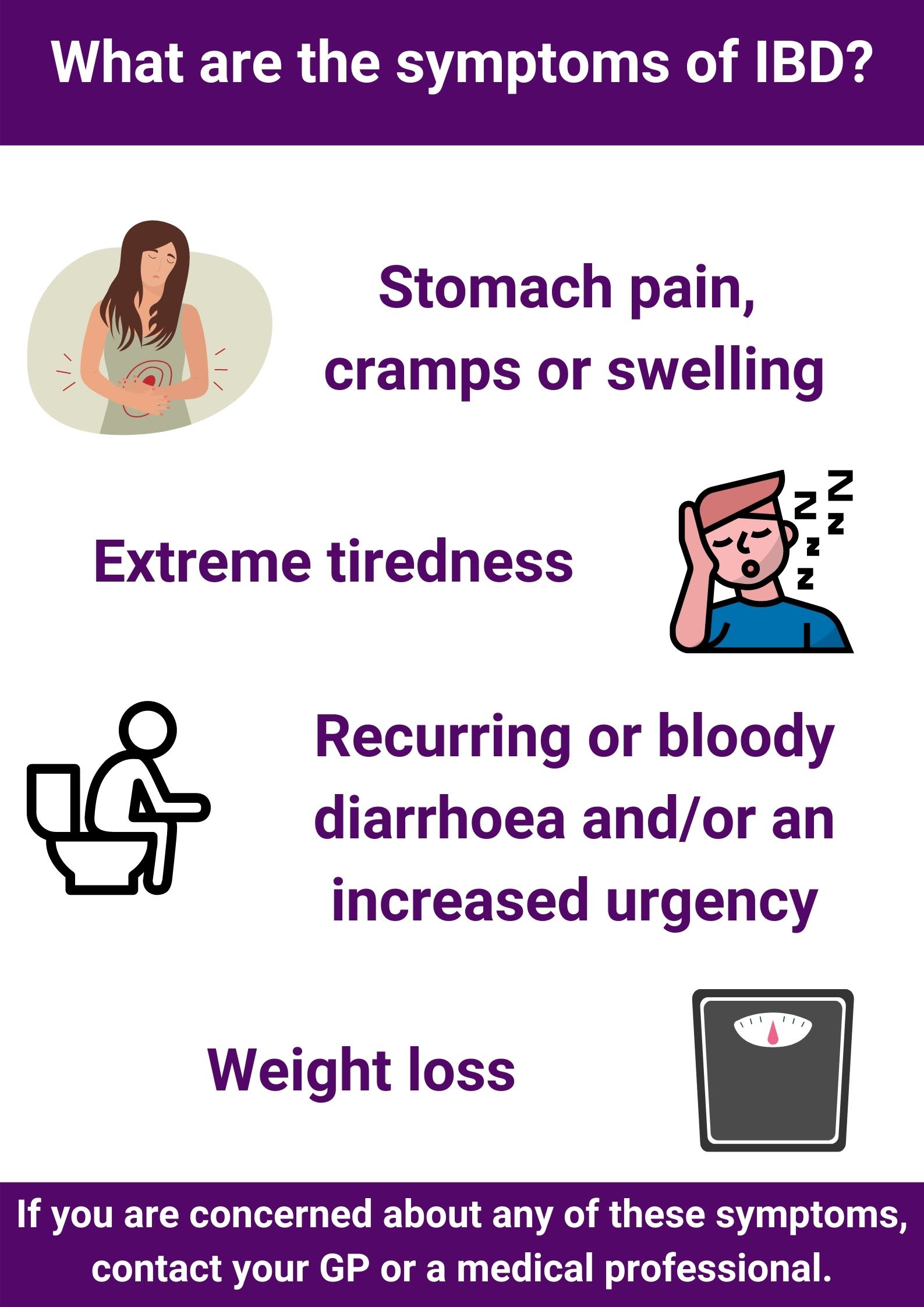
IBS v IBD
Inflammatory Bowel Disease (IBD) and Irritable Bowel Syndrome (IBS) are not the same thing though they can present similar symptoms such as diarrhoea, stomach pain, and weight loss.
IBS is a gastrointestinal disorder of which the cause is not known. Treatment usually includes changes to lifestyle and diet. IBS affects between one and two in 10 of the population in the UK.
IBD is an autoimmune disease caused by inflammation. It affects fewer than one in 100 people and must be treated with medication, rather than diet alone.
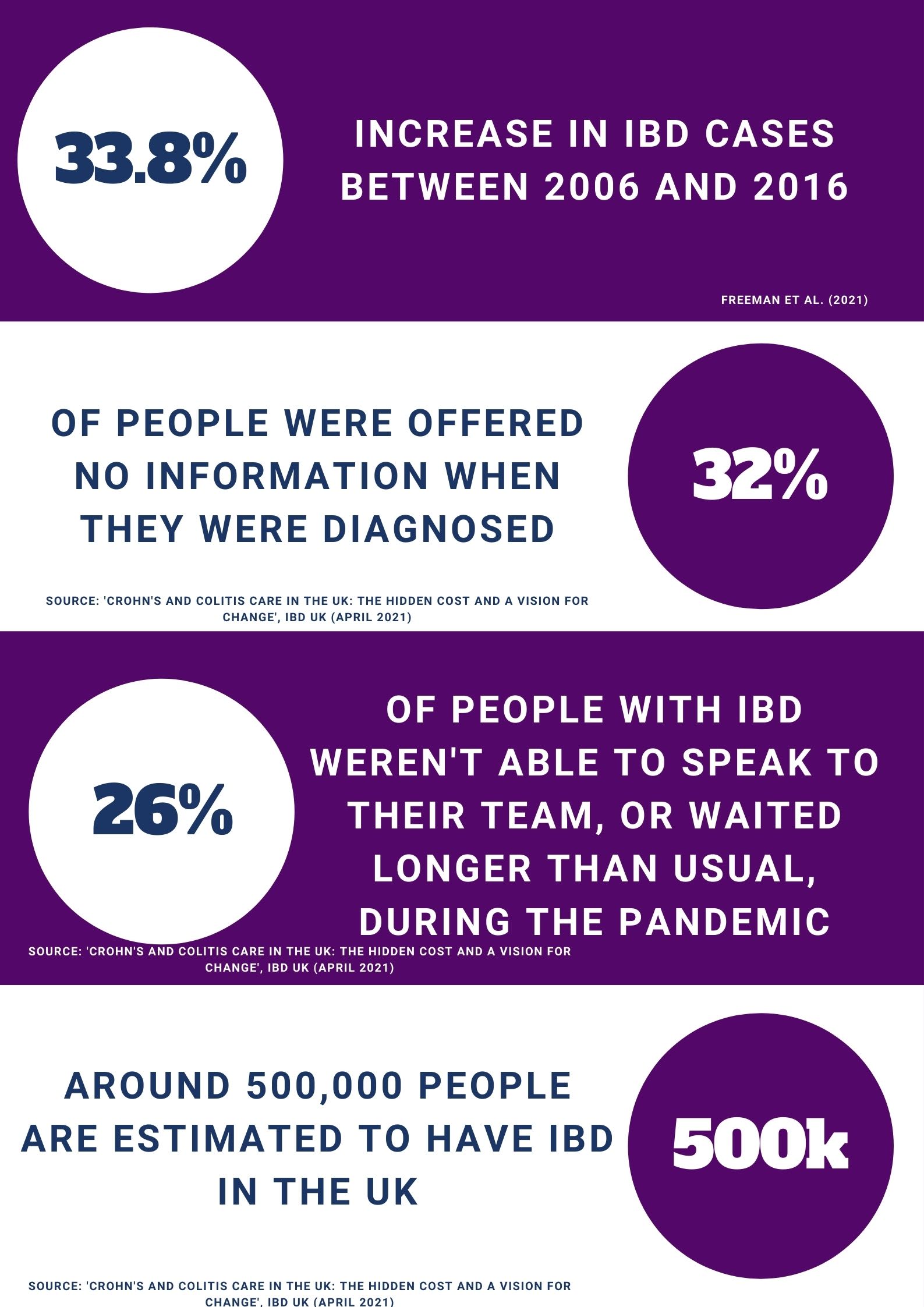
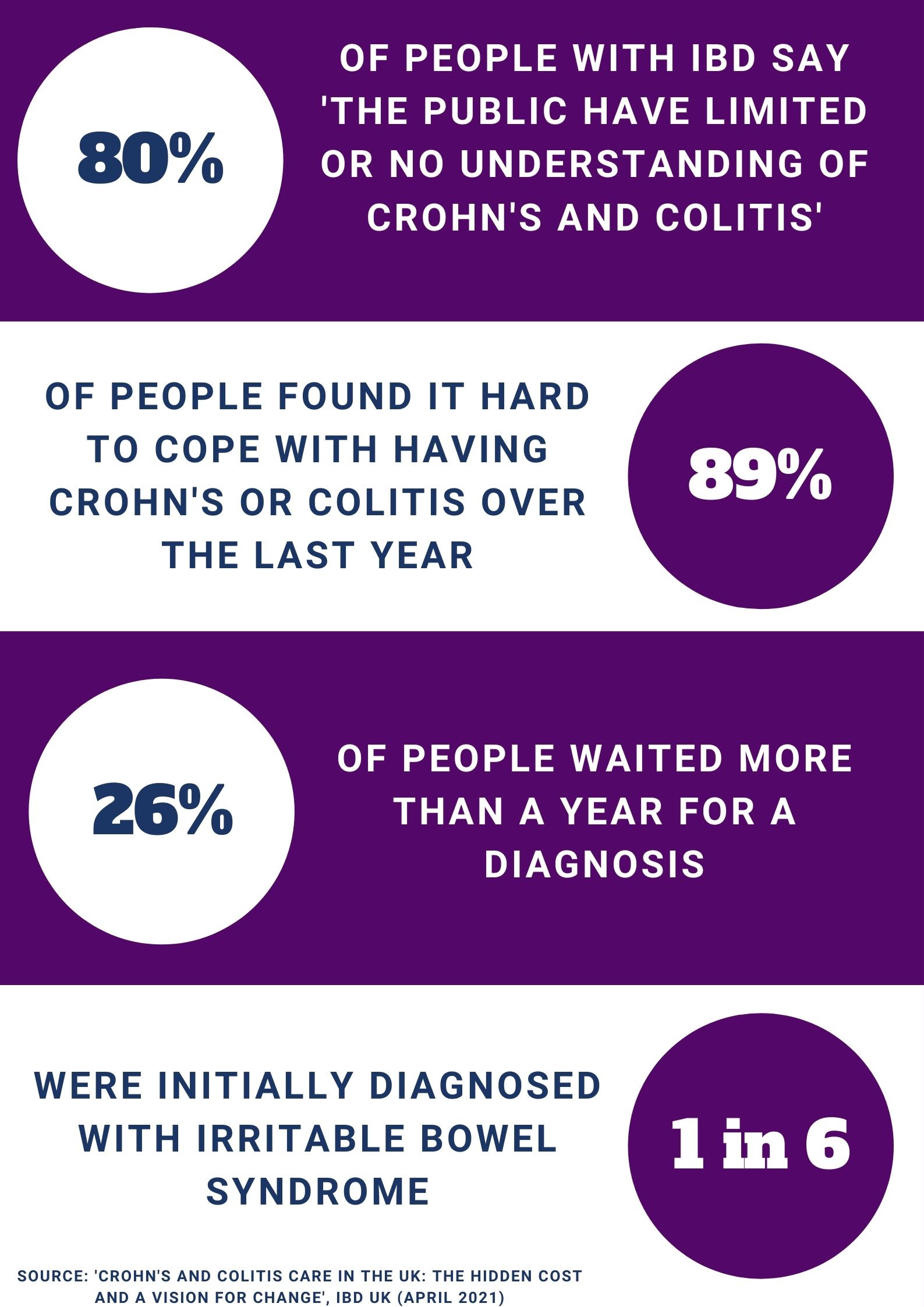
Tackling Stigma
Cases of Inflammatory Bowel Disease are on the rise, with a stark rise in cases in recent years. While IBD was previously most prevalent in the West, it is now on the rise in places such as China as well as rates increasing in places like the UK.
The increased instance of IBD is being increasingly related to the effects of industrialisation and urbanisation, as well as potential links to processed food, though these are by no means guaranteed links.
There have even been suggestions of links between IBD and microplastics.
All this means that IBD is not going away and will instead be a growing problem.
As more and more people are affected, there is a growing need for effective treatment and public awareness of a disease that is relatively unknown amongst the wider population.
IBD remains a largely unknown condition despite the 500,000 people it affects in the UK and this can have a negative impact on people's day to day lives.
Having IBD is difficult enough without other hurdles being placed in the way.
It can be as simple as things such as public toilets - particularly accessible ones - or being able to go to the toilet more regularly than usual.
This is what people are fighting back against with the power of social media.
Chronic Illness and Social Media
It can feel at times that social media has become all-encompassing, dominating almost every facet of our lives across multiple platforms.
It can feel, too, like it is a scourge on society and can leave us questioning its benefits as the seemingly increasingly negative elements of social media rise to the fore.
However, it can still be a force for good, connecting people across the world and providing vital support and comfort to those who need it.
This is particularly the case for those with chronic illness, for whom having such a condition can be a lonely and frightening experience.
On Instagram, #chronicillness has been tagged on 4.3 million posts. #chrons has attracted 713,000 posts and #ulcerativecolitis 432,000. On TikTok, the numbers are even bigger. #crohnsdisease has amassed 181 million views, #ulcerativecolitis 153 million.
Many of these numbers are spurred on by some large, high-profile accounts that do much to raise awareness; Mesha Moinirad, aka MrColitisCrohns (right), has over 3.1 million followers on TikTok. One video, where Moinirad openly shows his stoma, has over 172 million views.
Social media has opened up a whole new audience at very little cost for those who wish to raise awareness.
Suddenly, it is no longer something that only very few people know about. Instead, millions of people are able to see what it is like to live with Crohn's disease or ulcerative colitis.
For those with the disease, this can have a potentially huge impact on coming to terms with their condition, their day-to-day lives, and their mental health.
Connor Edwards, who over 1,400 on his Instagram account on which he raises awareness of IBD.
He said: “Before I was diagnosed I had no clue about either Crohn’s or UC [ulcerative colitis] and when I was diagnosed I had to do my own research using social media and other sources to contact people to find out more about the illness.
"I started to realise how little information there really is shared on these things and how many negative stigmas there are around it all.
"I decided to use my Instagram not only to track my journey but to share it with others and to help share information on not just Crohn’s and Colitis but chronic illnesses.
"I honestly feel that with these illnesses affecting more people than ever, and with so many more young people being diagnosed at younger ages, more information and stories need to make it to wider sources."
Yet it is not all about large followings and big numbers. On Instagram in particular, there are thousands of accounts dedicated to IBD with a wide range of followings.
Often, it is not about getting the most followers but about a way for people to track their own journey or express their feelings.
“Before social media, I’d just started writing a blog and I did it both as a way to channel all of my emotions and write down what was happening and also to kind of tell my family and friends without having to repeat myself," said Billie Anderson, who now has over 15,000 followers on Instagram.
"Because it’s when everyone is like ‘why are you in hospital?’ I’ve told this story 10 times I don’t want to have to keep telling everyone."
Indeed, social media is used by a whole range of people in lots of different ways in relation to chronic illness.
Away from the eye-watering numbers of TikTok and Instagram are support forums on Facebook where people come together to share experiences and advice. This is not about raising awareness, but the nitty-gritty of living with IBD.
Finally, there are those on the other side, the healthcare professionals, who are harnessing social media to spread their knowledge, something that became acutely powerful during the Covid-19 pandemic.
These are their stories.
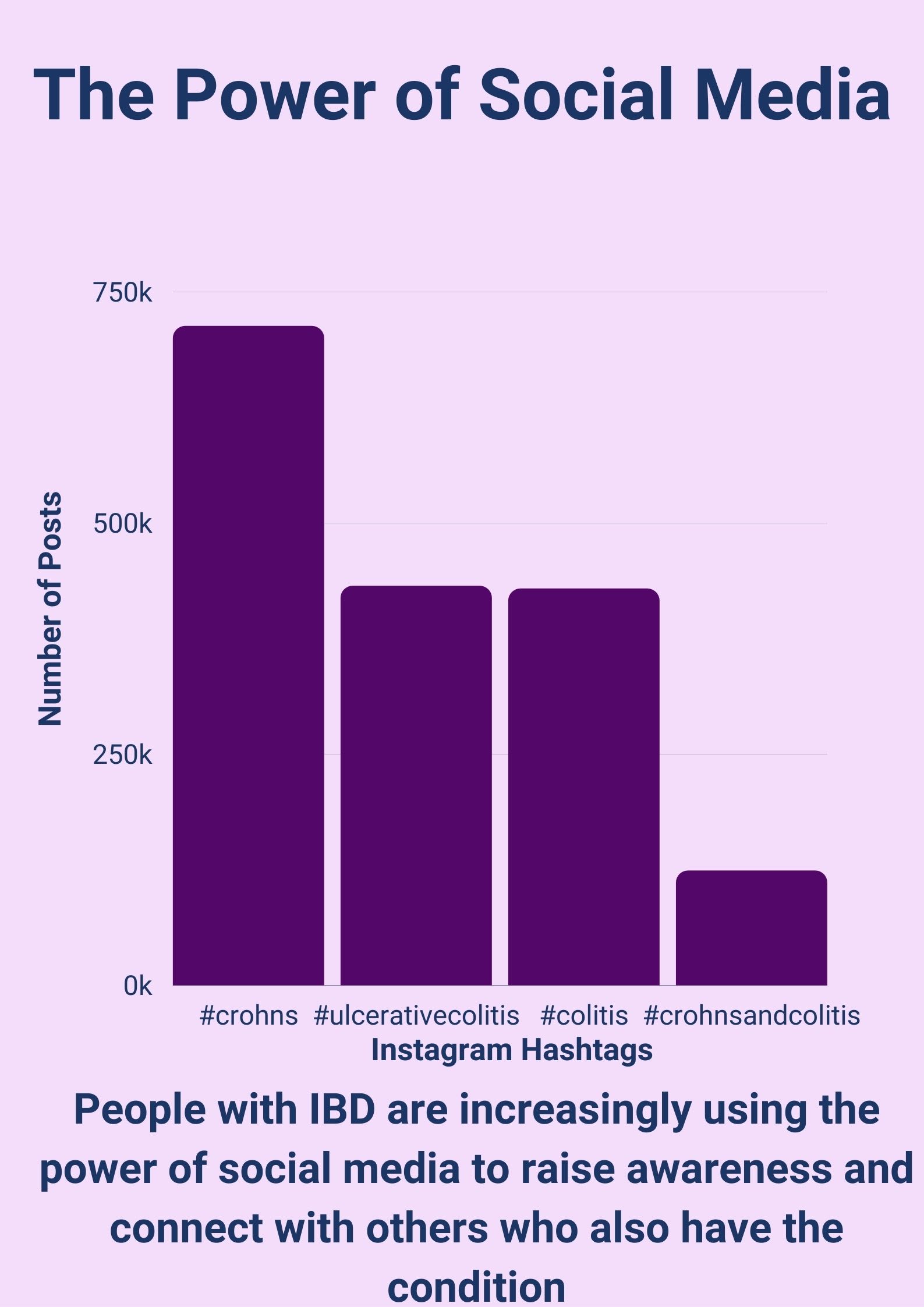
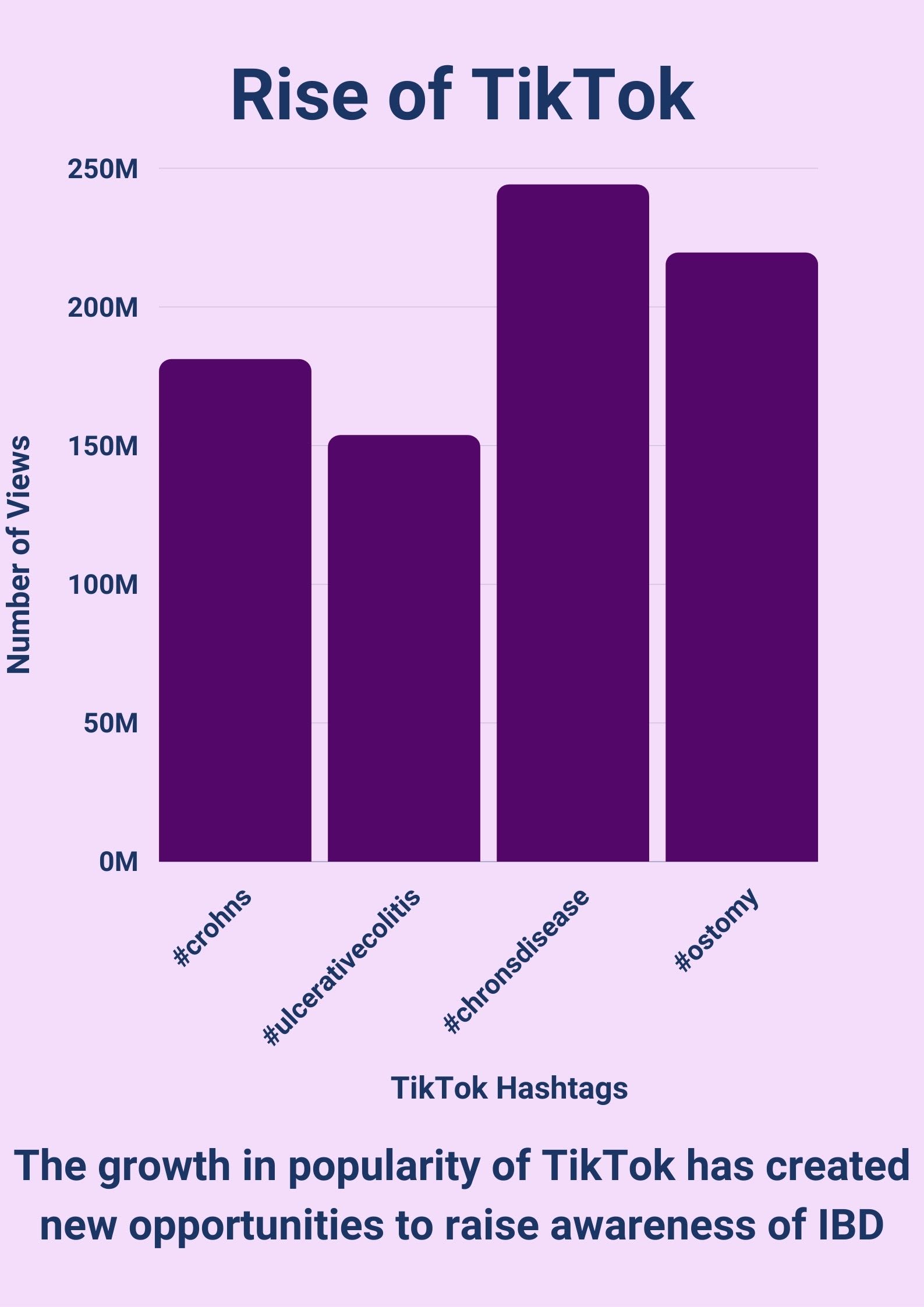
Kian Scott-Loach, Digital Manager at Crohn’s & Colitis UK said: "We know many people living with Crohn’s and Colitis, including myself, find comfort in discussing their condition and experiences with others online.
"Reading others’ stories on our social media platforms helps many feel they are not alone, and our private Facebook Group is an invaluable safe space for people affected by the conditions to find advice and support from people who understand what they’re going through."
Billie Anderson
"Crohn’s & Colitis aren’t rare I think it would be safe to say, they’re not rare diseases. It actually affects a lot of people in the UK and I think the fact that we’re so prudish as a country to not talk about it.
"Your bowel health is so important to your overall health, it can tell so much about you so that in itself would help a lot of people get diagnosed and push a lot of medical professionals to recognise it better.
"Outside of the gastro teams, I don’t think that even some medical professionals would recognise it in the same way that you would if you already knew what it was."
Billie is on a mission. Armed with her Instagram account and her blog, she wants to raise awareness of IBD alongside sharing advice and support for those with the condition.
Billie was diagnosed with ulcerative colitis five years ago and had stoma surgery a year after.
She initially started a blog as a way to deal with all her feelings, before friends encouraged her to be more public with her blog as more and more people began to respond positively.
"It was just so lovely to see such a positive community.
"I think that social media does get a bit of a bad rep sometimes and I could just see so many people using it in such a lovely way and then just as things progressed just started sharing more and more and more."
Though Billie's blog began as a personal exercise, she now has an audience the size of a moderately sized football stadium, something that can come with its own challenges.
"I never thought I’d get to the numbers I’m on now it’s just absolutely baffling. I thought a thousand people was a lot. Sometimes it can be a bit intimidating.
"I definitely think there’s a fine line and you do have to tread it carefully and I really try to make sure that what I post is directing people towards the right professionals rather than being like “I know everything” because I know I don’t.
"The condition is incredibly unique for each person, so I definitely think a lot more about what I post now than when I was using it just for the few."
Billie's platform now means that she is able to interact with thousands of others who also have IBD and uses her platform to share useful tips and share experiences.
But Billie also places an emphasis on ensuring her posts find a balance between positivity and reality.
"Even those really granular things that you wouldn’t necessarily consciously think about that putting up a photograph of me making dinner or what I’m wearing actually does help people.
"It can be so small but if you see someone and it’s like oh my god she can wear skinny jeans so I can wear skinny jeans, it can be even as small as that and I think that’s really important.
"But there’s also a lot of positivity in showing the good with the bad I think.
"Because if you’re only ever showing that everything’s great, everything’s amazing and I’m loving life, but in reality, you’re getting five bag leaks a day or shitting all over the floor and somebody else is doing that; you’re not really translating what the community is feeling.
"Particularly with sharing stoma life I think there can be a lot of pressure to be like everything’s great when actually not everything is great all the time.
"I see a lot of those Instagram versus reality posts and it’s like no why don’t you just post what your day to day is like?
"Why does something need to qualify for social media and something qualify for reality, why can’t they be one and the same?"
Omma Ahmed
For Omma, fighting stigma and raising awareness has multiple layers. As a Muslim woman in the South Asian community, she faces different barriers to most.
"It's not something that's talked about quite a lot because it deals with a bowel condition, it can be seen to be quite embarrassing. So it's always sort of hidden and I felt that within my own community," said Omma.
"Through my Instagram, I have had a lot of especially South Asian girls message me and they have general accounts and they’re like it’s so nice to meet someone who’s being quite vocal about it because they feel like they could never publicly talk about the fact that they have Crohn’s or UC.
"Some have even said that their family don’t believe them that they have this condition, that they’re faking it just to get out of doing things."
Omma has written about having a stoma bag as a Muslim woman and the challenges this can bring. There are challenges in relation to social media too.
"I’m still quite a small account at the moment. Because I’m Muslim and I wear a hijab I can’t sort of just show my stomach, be in my underwear, show off my scars to raise awareness and I think a lot of the accounts that tend to be a bit bigger are those that are able to physically show their disability.
"In a way, I think that hinders me reaching a wider audience because I think it sort of puts me in a box but I think it’s nice that I’m still able to reach the people that I am."
But Omma is determined to raise as much awareness as possible with her Instagram account which has over 1,500 followers.
"The aim is to raise awareness throughout. The people with Crohn’s and Colitis already know about it so the aim was to raise outside of that community just so that it makes it easier for us and so we don’t have to explain ourselves.
"Social media has been great in that respect as it’s allowed me to collect my thoughts and put them into words and try and explain it as best as possible.
"I try and keep both audiences in mind in terms of people who have the condition and people who don’t and are just trying to learn more about it."
Paul Westlake
Yet you don’t have to have an Instagram or TikTok account dedicated to your Crohn’s or colitis in order to harness the power of social media. Understandably, being so open and public about your condition is not for everyone.
Away from the hashtags and the millions of views, there are forums and community pages dedicated to all things IBD. They are places where people can safely talk about bowel habits, stomas, and medication without anyone blinking an eye.
The Crohn's & Colitis UK Forum on Facebook has over 50,000 members, from those newly diagnosed to those who have had over 30 years or more with IBD.
It is a place filled with huge reserves of knowledge, experience, and advice from people who have been there, done it and got the medal – and often the scars – to prove it.
Everything is up for discussion, whether that be side effects to certain medication, to how people deal with symptoms or how to drink the dreaded pre-colonoscopy drink.
It's not just solely medical questions on the table either, the forum is often a place for people to post their achievements, whether that be going into remission or graduating from university.
There are questions too about how to deal with workplaces that are not accomodating, applications for Personal Independent Payment - or PIP - and how to travel when your condition is causing problems.
It is a stark reminder of how encompassing a chronic illness can be but also of how much easier can be when there are thousands of people who are also in the same position and with whom you can share knowledge and experiences.
Paul Westlake is one of the 50,000 members of the forum and is one of the most active, giving out advice and information where he can.
“The Facebook algorithm kicked in and said you might like to join this group and I did," said Paul.
"Then I saw that there were loads of people who were very scared; just been newly diagnosed, doctors and nurses didn’t have enough time to answer their questions to they were using social media to get answers.
“And I thought these poor, poor people I must do something to try and make things a little better for them. I’ve got the knowledge, I’ve got the information and I’ve got a bit of time as well, the least I can do is share what I know.”
Paul was diagnosed with ulcerative colitis in 1986, long before the advent of social media and said just how powerful a tool it can now be in allowing people to find out more about their condition.
“I was diagnosed long before the internet and social media, so I’d sort of kind of come to terms with my condition long before I joined any internet forums.
“I was sent on my way with absolutely nothing mentioned about the condition at all. I didn’t really know if it was going to be a short-term thing or anything so pieced all those bits of information together over many years.
"In the late-90s, the internet came along so that made things a teeny tiny bit better because you could google stuff. It was quite a different experience, in some ways more scary, in some ways less scary."
The benefits of social media don’t stop at advice, support and awareness either.
For Paul, it enabled him to improve his treatment by switching hospitals after realising via social media that his treatment was sub-standard.
“To benchmark your hospital treatment, your medication experience, you don’t know what good treatment looks like.
"How can you know what that looks like unless you talk to other patients and how can you talk to other patients nationwide if not on social media?
“So I benefitted from hearing other people’s experiences on social media. It’s been an absolute boon to me as well.”
For many, forums like this are a refuge in what can be an often overwhelming experience with lots of information being thrown at you left, right, and centre.
While the internet is a source of lots of information, it is easy to think the worst when searching for side effects of drugs or the impact the conditions may have on your life.
For people like Paul, the forum is a great way to be able to reassure people with their own first-hand experiences.
“I’ve been trying to tell people that you can lead a perfectly normal life. You see parents of teenagers who have just been diagnosed asking ‘what does the future hold for them?’.
“Well, I was diagnosed before I went to university. I went to university, got my degree, got my PhD, been married 30 years, two healthy grown-up sons, foreign holidays, restaurants all that great stuff. Didn’t really stop me doing anything.”

Charlie Lees
Social media is a tool that has revolutionised the way people with chronic illnesses are able to communicate, with both one another and to the wider world as they look for support, advice, and to raise awareness about their condition.
Yet it is not just the patients that have been able to harness the power of social media. The healthcare professionals are at it too.
Professor Charlie Lees is a consultant gastroenterologist at the Western General Hospital in Edinburgh and a professor of gastroenterology at the University of Edinburgh.
Professor Lees has over 8,500 followers on Twitter where he shares information about IBD with both patients and fellow healthcare professionals.
“I think I’ve always been something of an early adopter with technology, and with Twitter in particular, I started in 2010 so I’ve been building my craft for some while. Back then there were only a handful of us on there discussing ideas.
“For me it’s been a combination of a tool via which I can distribute and share ideas, where I can learn from others – and that’s both from other clinicians and academics working in the space and allied fields.
"Very often from social media, I get ideas that I can then bring back to apply to IBD. But it’s also about supplementing my clinical practice to enable me to learn more from patients about what their needs are too."
Social media, then, is not just a tool of the patient but also of those working in healthcare as a way to improve treatment and best practice.
“A huge part of the way I see I can help improve the lives of patients is by improving the standards of care that physicians deliver so it’s challenging healthcare professionals with the latest data and knowledge and treatment paradigms and know-how with very practicable insight to help them when they to go their clinics and treat their patients.”
It has been an invaluable tool, too, during the pandemic when health services have been stretched and many people with chronic illnesses were told to shield.
It was often much harder for patients to get proper consultations with their nurses and consultants but social media was able to step in, to some extent.
“The reaction from patients on Twitter has been overwhelmingly positive in particular and I really noticed it during the Covid period, where patients have been desperate to have information from trusted sources and I’m grateful that they consider me to be a trusted source.
“A lot of patients just find it difficult to get that from their local clinical teams, because their clinical teams are very overstretched or they’re living in other parts of the world where they don’t have access to the expertise."
But Lees is not just focused on spreading information through his use of social media. He knows just how powerful a tool it can be in getting more people aware of and talking about IBD.
“I definitely see raising awareness of IBD as a big part of my role.
"That helps patients, it helps clinicians, it helps increase funding for research and for services and I think generally it helps people that have IBD if more people are aware of what it means to have IBD and to live with IBD. So that’s something I take very seriously.
“Success to me would be to use the scalability of digital media so I can help make the biggest impact by helping the most number of people who are affected with Inflammatory Bowel Disease live a life that is as unaffected by their condition as possible. So that’s the bit that excites me as well.”
Inflammatory bowel disease affects almost 1 in 100 people in Europe and N America
— Charlie Lees (@charlie_lees) January 16, 2022
Incidence is rising fast in the developing world
But what causes it and what are the consequences of IBD?
Follow this graphical thread to learn about Crohn's disease and UC pic.twitter.com/NVYbtJselr
Crohn's disease can have a significant impact on a person's life:
— Charlie Lees (@charlie_lees) November 24, 2021
• physical aspects
• psychological aspects
• long-term complications of disease (and therapy)
• everyday life
We should remember this as physicians when we talk to our patients in clinic pic.twitter.com/mfXF2oBZcP
We now have clear guidance from JCVI on those patients eligible for a 3rd primary dose of COVID vaccine.
— Charlie Lees (@charlie_lees) September 2, 2021
This includes IBD patients on infliximab, adalimumab, ustekinumab, tofacitinib, prednisolone and some on high-dose aza/mp/mtx.
Details here & belowhttps://t.co/aykyv766sJ pic.twitter.com/Lc8mkxuH5B
My Story
In November 2020, I was diagnosed with ulcerative colitis. It was not unexpected, having spent the best part of a year either avoiding going to the doctor or, after I finally went, waiting to be seen due to lockdown.
Now over a year into my lifelong journey, the power of social media for someone with a chronic illness is something I've experienced first-hand.
For most people, being diagnosed is incredibly scary and I was no different. You have so many questions, there is so much information, and your mind naturally flits to the worst-case scenarios.
On top of that, being diagnosed amidst a pandemic that has placed huge stress on the NHS has understandably made access to services harder and slower.
Yet social media has been a beacon of support, advice, and knowledge throughout this time. Whether that be being able to ask someone a question about a specific medication, to seeing people thrive despite their condition, or even people increasingly knowing about IBD thanks to some social media accounts.
Little by little, it has made things easier to manage as I strive towards getting my condition into remission and living an increasingly normal life. Without it, I would undoubtedly be in a worse place.
Social media has many vices but for those of us with chronic illnesses, it has proven a vital tool.
